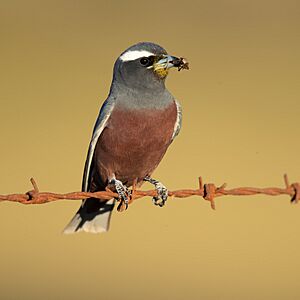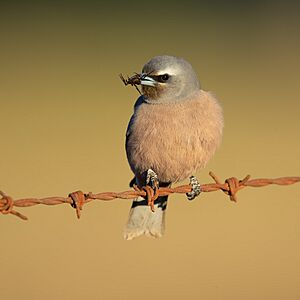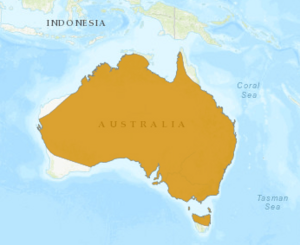White-browed woodswallow facts for kids
Quick facts for kids White-browed woodswallow |
|
|---|---|
 |
|
| male with spider | |
 |
|
| female with spider | |
| Conservation status | |
| Scientific classification |
|
| Kingdom: | Animalia |
| Phylum: | Chordata |
| Class: | Aves |
| Order: | Passeriformes |
| Family: | Artamidae |
| Genus: | Artamus |
| Species: |
A. superciliosus
|
| Binomial name | |
| Artamus superciliosus (Gould, 1837)
|
|
 |
|
| Script error: The function "autoWithCaption" does not exist. | |
Script error: No such module "Check for conflicting parameters".
The white-browed woodswallow (Artamus superciliosus) is a cool bird found only in Australia. It's a medium-sized bird, about 19 centimeters long. This means it's roughly the length of a regular pencil.
This bird has very special feathers. It has a white stripe above its eyes, like a white eyebrow. Its head is black, and its upper body is a deep blue-grey color. The underside of its body is a warm chestnut brown. Female woodswallows are usually a bit paler than the males. Like many woodswallows, this bird has a split tongue.
White-browed woodswallows love to travel! They are called nomadic birds because they move around a lot. They travel in groups, from just a few birds to hundreds or even thousands. They often fly all over inland Australia. In winter, they usually head north to places like the Northern Territory and central Queensland. In spring, they fly south to build their nests. These birds often hang out with another type of bird called the masked woodswallow.
Contents
Where White-browed Woodswallows Live
You can find the white-browed woodswallow all over Australia. They are especially common in central New South Wales. Good news for these birds! Experts say they are not in danger of disappearing. They are considered a "least concern" species.
Homes and Habits
These woodswallows live in many different places. They like the edges of rainforests and woodlands. You can also spot them in scrublands, on golf courses, and even in suburban streets. They can even live in dry, arid parts of Australia. These birds make a sound like 'tchip-tchip'. It's similar to the call of the masked woodswallow.
Reproduction and Life Cycle
White-browed woodswallows usually lay eggs between August and December. They might also breed after it rains. They build their nests in bushes, tree branches, or even hollow stumps and posts. Their nests are made from small twigs, grass, and tiny roots.
A female woodswallow usually lays 2 to 3 eggs. The eggs are white or grey. They often have brown-grey spots or blotches on them.
What White-browed Woodswallows Eat
White-browed woodswallows mostly eat insects. They are good at catching them! But when flowers are blooming, they also enjoy drinking nectar. Nectar is the sweet liquid found inside flowers.
 | Mary Eliza Mahoney |
 | Susie King Taylor |
 | Ida Gray |
 | Eliza Ann Grier |


